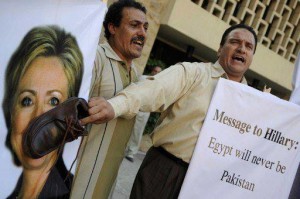Via As’ad AbuKhalil, this picture evidently represents the views of many Egyptians:
Secretary of State Hillary Clinton just returned from a visit to Egypt to meet with the new Islamist President Mohamed Mursi. Her armored motorcade was pelted with tomatoes and shoes by protesters as she drove through Alexandria. From the very beginning, the upheavals in Egypt have scorned US support for the former dictator Hosni Mubarak and Washington’s current efforts to exploit the power transfers now going on. Many Egyptians, according to AbuKhalil, are also criticizing Mursi for even meeting with Clinton, even comparing him to Mubarak.
See Jacob Hornberg’s piece on Clinton’s visit.




